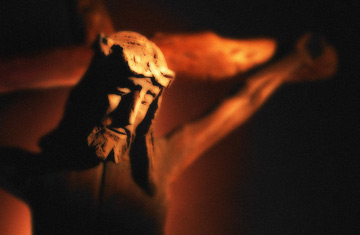
TIME: You and Karen write that the "Judas" author was angry, particularly at the Christian church's developing cult of martyrdom. You write that he conveyed "the urgency of someone who wants to unmask what he feels is the hideous folly of leaders who encourage people to get themselves killed in this way." Whom might he have meant?"
Pagels: So far as I know, all the so-called "fathers of the church" glorified martyrdom. Ignatius, who wrote in Syria in around 108 AD, speaks passionately about "being ground up by the teeth of wild beasts to become God's wheat," — that is, by martyrdom, he becomes the bread of the Eucharist.
What could have provoked such adamance?
Christians were undergoing terrible persecution at the time. Leaders like Ignatius felt that a willingness to "die for God" was essential for the movement to survive; otherwise, its members could be intimidated, and it might have died out.
Was it a successful strategy?
Yes. We have evidence to that effect. The philosopher Justin wrote that Socrates said that the purpose of philosophy was to prepare us to die bravely, and when Justin saw illiterate Christians facing torture and execution in the public stadium, he became a convert — and later a martyr himself.
And the Judas author objected to this?
He did not suggest that a believer should deny being a Christian, even if the penalty were death. But he challenges leaders who encourage people to "die for God" with what he thought were false promises — huge rewards in heaven, and guaranteed resurrection.
Does this tell us something new?
Before these discoveries, we knew little about Christians who opposed martyrdom — or opposed encouraging it — because the people who challenged the dominant view were ridiculed as cowards and heretics, and their writings didn't survive. The Gospel of Judas shows what intense and painful arguments martyrdom caused among Christians.
Both Catholicism and, to a lesser extent, Protestantism honor martyrdom. And some scholars suggest that Islam picked up the idea from Christians. Is it possible that despite all that, martyrdom isn't really intrinsic to the faith?
Before either Christians or Muslims spoke of martyrdom, Jewish communities celebrated those who were willing to "die for God." After Jesus was crucified by the Romans, those who still remained his followers were suspected of treason against Rome, and leaders were executed. The focus on crucifixion has a lot to do with fact that his followers remained in danger of arrest, torture, and execution themselves. Without that I can't imagine that discussions of his suffering and death would have occupied the central place that they do for many Christians.
Could Christianity have done without it?
Certainly. Many Christians focus more on Jesus' teaching about relationships — loving God and one's neighbor, caring for the sick, the poor, those in prison and destitute — teaching that what God commands is to "love one another." But because it started after Jesus' crucifixion, his followers often have been willing to risk dying for what they see as the sake of the truth. You can see it in the life and death of Martin Luther King, Jr. — his willingness to risk violence and death allowed him to defy those in power and change our society.
Do you think that the writer of the Gospel of Judas was familiar with the idea the Jesus died for our sins?
Yes — the earliest writing we have about Jesus, from the apostle Paul, says that Jesus "died for our sins," and many insisted that Jesus had voluntarily died a sacrificial death. But others asked, What kind of God are you talking about? If God would not allow Abraham [in the Hebrew Bible] to offer his son Isaac as a human sacrifice, but told him to offer a ram instead, would God then sacrifice his son Jesus? Doesn't this suggest that God is some kind of monster, instead of the loving God of whom Jesus spoke? Would God refuse to forgive human sin apart from human sacrifice?
Do you yourself have any affinity for that last question?
I think it's worth asking, and long overdue for those who haven't asked it.
Do you feel it's strange to say, as orthodox Christians often do, that God required Jesus to die for our sins, and that this is the greatest demonstration of God's love?
Yes. Perhaps especially to a parent whose son has died. That happened to my late husband and me when our first son was six. And like many parents with that experience, we could hardly hear those words the same way others do.
The Judas writer doesn't ask that outright.
No. His concern was about leaders who encouraged martyrdom, and in this gospel, the other apostles stand in for these leaders, and he criticizes them harshly. I don't want to sound like I'm advocating the Gospel of Judas. What I love, is that this sort of document shows you the other side of the moon, the voices of the pe ople who were regarded as not articulating what became the official doctrine of the Church — a more dense, more detailed, more human picture of the early Christian movement than we've ever had available before.
